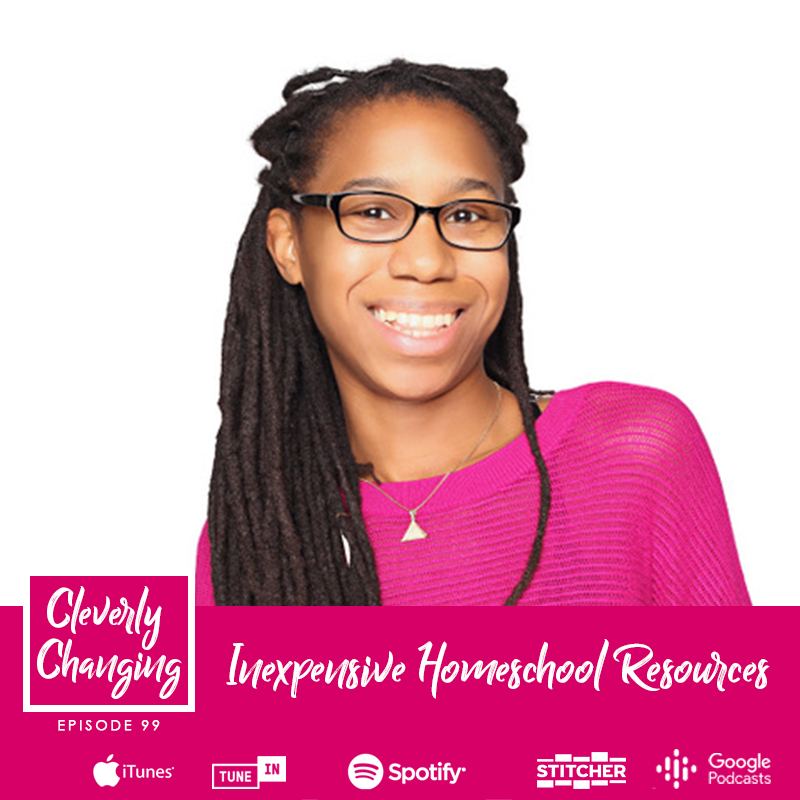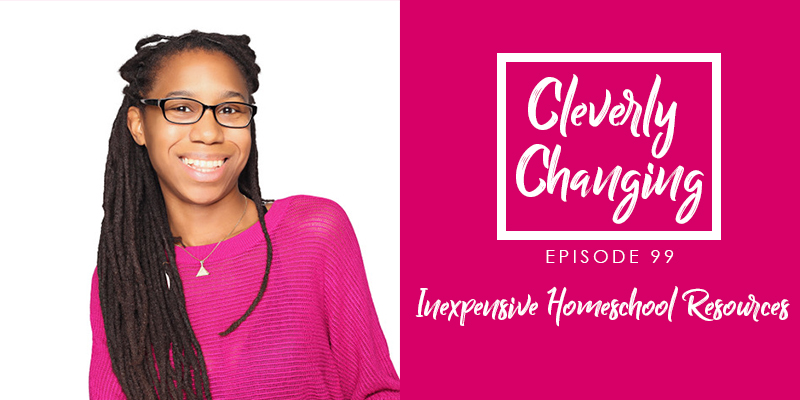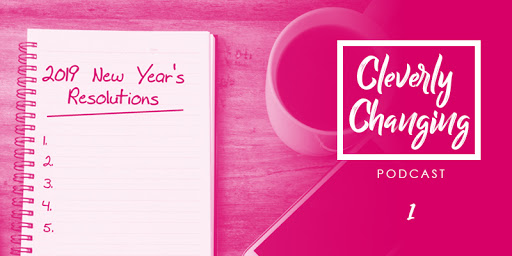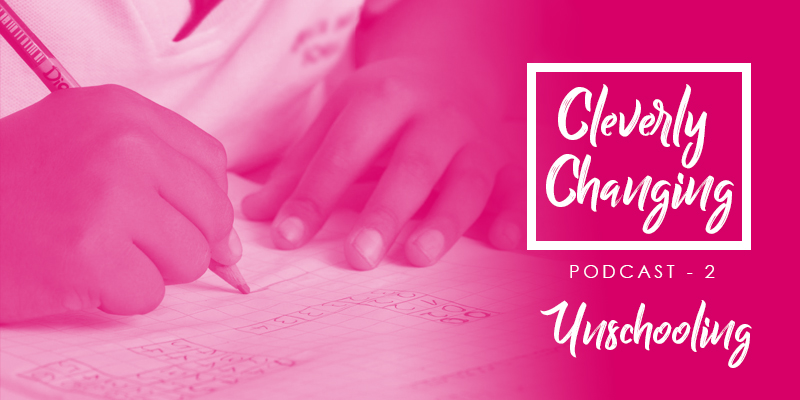EPISODE TRANSCRIPT
Speaker1: [00:00:09] Elle and Miriam are two Black homeschooling moms embarking on a self-defining journey. Listen in on conversations that will encourage you to be your authentic self while uplifting your spirit and motivating your inherent potential. They’re defining what culture is for their families and want you to do the same. Bring your children along too, so they can meet the cleverly cultured kids. They’re all for teaching the babies while they’re young, adapting to the challenges of parenting, homeschooling, and being willing to learn the lessons that the children have to offer. It’s all about uplifting one another and reclaiming your innate greatness.
Speaker2: [00:01:10] Hello. Hello. Hello. Welcome back to another episode of the cleverly changing podcast. I am one of your co-hosts, Miriam. I am an urban farmer, a homeschooling mom of four. And an all-around creative genius. Okay. I don’t know about genius, but that’s okay. I’m going to do my best to try to stay focused. Elle usually keeps me on track. And now today, it’s my job to keep myself on track. Let’s see how this goes. Today I’m going to take you all on a short hop, skip, and jump through using free resources. Every homeschooler loves a good free resource. I mean, anything from YouTube to worksheets to things that are outside the house. Museums and things. Why? Because they’re free. And who doesn’t appreciate free?

Speaker2: [00:02:31] Now, let’s go ahead and think about how we can best utilize things that are free. Now, it’s very, very, very important to understand that we get what you pay for.
Speaker2: [00:02:52] Or don’t pay for.
Speaker2: [00:02:55] In some instances. So, when we’re thinking about what resources that we want to use that are free, it would be in our best interest to see how that free resource would fit into our plan, whether it’s a lesson plan, whether it’s a broad plan for learning something, or even if it’s supposed to be something. Just fun. Right? There’s a way to weave it into what we’re doing. And just because it’s free doesn’t mean it’s going to be good. And just because it’s free doesn’t mean it’s going to be helpful. So we have to think about these—types of things when we’re making use of the freebies. Now, I know that when I first started, I was like, I’m going to use everything free. I’m not paying for anything. I mean, it’s possible it’s doable, but you kind of miss out on certain things. So like around here in the Maryland, DC, and Virginia areas, there are lots of things to do. There are lots of free things to do. But there are also discounted things to do too. Don’t forget about the discounted things, folks. We’re talking about free resources, but I just wanted to throw that in there. You know, a $15 homeschool day at the Baltimore Aquarium that’s a great deal. Let’s not skip out on that. Well, I mean, you don’t want to skip out on some things that don’t fall under the overarching theme of I’m going to homeschool for free guys, so, you know, do what you want to do. Do what works for you and your family.
Speaker2: [00:04:58] Do what feels comfortable, what feels good, and what’s going to further your educational goals for your family. That’s the most important thing here. So let’s get back to Free 99. See what I’m saying when I say I tend to go off a little bit. I’m trying, I’m trying. I’m trying to follow my notes, but that’s no fun. Okay, so where are we with our free resources? I know we’ve talked about some of these before, but for those who are new, who have not listened to Elle and I before, or who haven’t gotten back to some of those previous episodes where we discussed things that you can utilize for free, I want to take you back. I’m also going to give you some newbies. I hope that newbies, maybe you’ve heard of them before, I don’t know, but I’m going to share them to remind you or to put you on any hook. So let’s talk about things that are outside the house first. Museums. Now, not every museum is free, but tons of them are. And even some of the ones that were not free are now offering free virtual visits. And that’s great. That’s one of the I guess I’ll say cool things about the pandemic, right? A lot of things. A lot of entities, a lot of places, organizations, what have you. They’ve made this shift to being available virtually so you can peruse some of these museum collections online in the comfort of your home and the comfort of your car wherever, and see all of the cool things you can still get the little blurb that goes with it about whatever the piece is, who created it, how it got to be in the museum, all that kind of stuff.
Speaker2: [00:07:19] So museums are, you know, easily one of the coolest. I’m a nerd—one of the coolest freebies you can find. The Smithsonian, I believe, has a free virtual learning center. I believe it’s called Smithsonian Learning Center. You can check that out. And you can find a large range of topics from history to art too, you know, the Smithsonian. They got it all. You could also check with your National Park Service. So, in addition to the national parks, you’ve got your regional parks. And within regional parks, there’s often a lot more than one would think would be available. You can find wildlife preserves, nature refuges, and nature refuges. You can find themed playgrounds. You can find fishing opportunities. There’s lots of things in the parks. Botanical gardens. And a lot of times, they’re free or very, very minimally priced. There’s a place in Maryland. It’s called Brookside Gardens. My parents used to take me there all the time when I was a kid, and it was so much fun. So many flowers, so many open spaces, so many trees, and so many shrubs. It’s nice. And I don’t think Brookside Garden charges. So you could find loads of places like these around the country, wherever you are, that have these sorts of offerings.
Speaker2: [00:09:44] Now, the other suggestion that is no way. Last place, ask around. There are tons of hidden gems right under your nose. Ask around. What are you all do for fun? Where have you been that you thought was really interesting? You know, you could post these kinds of questions on your social media feed for your friends and family, and you’d be surprised at some of the responses, things you didn’t even know existed. So don’t be afraid to leverage your own personal network to find out what kinds of things are going on, where you can go, what you can do—the newspapers, you know, those little stands that are near the exit of your grocery store. There you go. They’re free. Pick them up, and flip through those pages. You’ll probably find a couple of events that are going on in your area that you can get to that are free, low cost, and full cost. But you’re going to find some things that you and your family just might be interested in. Let’s see. Oh, volunteer work. Not only is it a good chance for you to help out and learn things, but it’s also a great free resource. It’s free. Nobody charges you to volunteer. They’re charging you your time. I guess. There are so many places that accept volunteers, like an urban farm. Farms need volunteers. There are tons of places you’ll find animal rights groups, like pet shelters and things like that. You’ll also find other environmental groups like taking care of watersheds and rivers to volunteer at.
Speaker2: [00:12:06] Frankly, you can volunteer everywhere in churches and schools. There’s a lot of volunteer work around soup kitchens. I’m trying to think of one that’s a little maybe off the beaten path, but that’s plenty of things that you can volunteer to do. And not only are you helping your community, but you’re gaining some experience or some knowledge in whatever the area of volunteering is. So that’s fun. With COVID going on, I don’t know if some of these options are still available, but I have heard of families taking their children to like a post office or a bakery. Glass blowing shops, places of business where they will, you know, let your children see how this works, how it gets done. So you can check that out. A local bakery or something. They want to know how you guys pump out 500 donuts a day and things like that. You’d be surprised at how open some places are, especially when they feel like you’re really interested in what they do. So I’m going to move into the online space. Now, the Internet is a wonderful and vast place. Cue the Star Wars music. But you got to be careful out there. These Internet streets are not for the faint of heart. You put in your search query, and in a Google second, boom, you’ve got thousands of listings. To prove it can be a little overwhelming sometimes.
Speaker3: [00:14:25] Huh? I know.
Speaker2: [00:14:28] However. There are some that are really, really good and really worth your time and looking at. So Khan Academy. I used to use it a lot. Not so much anymore because we go with the flow around here. But Khan Academy has a large variety of topics, subjects, and course material for all ages, even for you, Mamas, and Babas. Okay. They’ve got a lot of stuff. So even if you’re just wanting to graze the top of a particular interest, that’s the spot to be. Let’s see. Who else? Oh, there’s something called iCivics. So for your history needs, social study needs. Legislation needs. That’s a good place to check out some free items on IE6. Now, I haven’t checked this place out personally. However, I’ve heard good things about it. It’s called The Good and the Beautiful. And I do believe it is a curriculum that I would pay for. But I have heard tell that they have free worksheets and resources and that I think it’s divided by topic. Even so, you can check them out if you’re looking for a couple of free things to add to your repertoire. Now, for some of these things, as I said before, you get what you pay for. You also want to make sure that it fits into what you’re doing. You don’t want just to grab something because it’s free. Just for the free of it. Yeah. Have a plan. Try to integrate it into what you’re already doing. Easy peasy. Lemon squeezy. It’s just called easy peasy. All around the home school, I believe they have a free All-in-One curriculum, as it says in the name. During homeschool, vacation is a great time to try them out. Look into them. Next, the library. Oh, my God. I can’t say enough about the library. The library is my jam. The library is where you want to be. Library should probably be your starting point. The library has more dangerous books around these parts. The libraries have tons of events beyond reading Circle Time. You can. See live events from authors. You can see live events on STEM subjects tailored just for kids, and they leave with their own little STEM item they have created. We’ll see—animal events. I remember we went one time, and we got to see a tarantula and this huge turtle and a bearded dragon.
Speaker3: [00:17:59] It was kind of cool.
Speaker2: [00:18:00] Will you see an African drumming shows there? I’m telling you, the library is one of your communities—the brightest diamonds of so amazing. You may also be surprised that your library has access to some of these paid-for sites. Kind of our library gives you access to places like ancestry.com. I do believe you have to be on library grounds or on library Wi-Fi to access that particular one. But there are others that you can do from home, like mango languages, ABC maps, and things like that.
Speaker3: [00:18:46] So look into.
Speaker2: [00:18:49] Your local library if you don’t want to do it online. Feel free to walk into your local branch and get to ask questions. Some libraries even have seed banks. Now I have a problem with seeds. I’m a little obsessed. I’ve got hundreds. I’ve got thousands. I’ve got seeds for dates. But your library may also have seeds for dates, and they give them away for free. They do like it when you bring seeds back. And not that you would be returning seeds you planted, as that isn’t impossible. You would save the seeds from the crops you planted to give back to the seed bank so they could be passed on to other growers. I think that’s so amazing. I love saving seeds. I love seeds. Okay. I said that already, but I love seeds a lot. Now your library is one of your best places. I cannot say that enough. You can find so many, many things. Things that I’m sure I have even discovered yet. But they’re there.
Speaker3: [00:20:17] Oh, yeah, they are there. You too.
Speaker2: [00:20:21] Blessing and a curse. You got to. You gotta kiss a few frogs before you find the prince. That’s how YouTube works. Now I’m going to give you a couple of channels that I find helpful. I’m certain there are many, many, many more.
Speaker3: [00:20:45] There are.
Speaker2: [00:20:48] Some things aren’t so child friendly, but there are some things that are older, child friendly, and there’s just craziness. So once again.
Speaker2: [00:21:00] So again, use at your own risk.
Speaker2: [00:21:01] But where are these channels? So, kids, black history. I really enjoy Little Miss Raya. She’s so much fun, and she’s so full of excitement in life. It’s great—Gracie’s Corner. Now, Gracie’s Corner is a vibe. She’s got little bop, her little jams. If you’re trying to teach him, skip counting, counting 200, all kinds of things.
Speaker2: [00:21:31] We also have Crash Course Kids. That is a lot of science. And I think I’ve seen a couple of historical things in there. But crash course kids, there’s also a crash course for adults or the older audience outside. Uh, Jewels TV. They’re fun entertainment, black children’s books read aloud.
Speaker3: [00:22:06] Um. That’s more.
Speaker2: [00:22:10] There are not leaving out that I use personally, but there’s plenty of things. So type in your topic. I wouldn’t suggest you do it with the kids present. YouTube takes a little planning because you come across a lot of junk before you come across what you actually want. So to, you know, kind of quell the disappointment if you starting a video and then being like, oh, nope, and and looking for something else, go ahead and do that beforehand. Research what you want to play. So then you could be playing the right things and not having to go through all the crap over. Uh, let’s see what else we got. What else we got? Oh, the Boys and Girls Club. So a lot of times their programming is free now. Everything’s not going to be free, but a lot of things will be. You can do like open gym night, things like that. If you’re going to play a sport, you’re probably going to have to pay something. But you can even ask them, you know, of opportunities for things. And hey, you never know what the answer is going to be. So Boys and Girls Club is an excellent choice. And there’s also a prodigy. It’s a little math game with little kids are these wizards, and they’re zooming through the forest and countering all these obstacles. And in order to win and fight these obstacles, you kind of answer these math questions. It’s fun. There is also a paid version, but the only difference between the paid and free versions is the. The points, the rewards, or whatever it’s called. You just get like different little, little items for the avatar. It’s whatever. It’s the same thing. But Prodigy is really good. It’s great. It’s fun. They’re answering math questions. There’s a couple other little extra things in there that make it feel a little more gamey, but they’re getting those mathematical practices.
Speaker3: [00:24:29] Worksheet works.
Speaker2: [00:24:32] I like worksheet works. You can print worksheets that have already been created. You can create your own. I particularly like them for handwriting practice. I can create, you know, worksheets that say paper. You are amazing. And he can write that, you know, things. That go with what you’re doing specifically so you can create your own who doesn’t like a create your own? But I guess if you’re looking for something quick, fast, and in a hurry, you might want to use one of the pre-done worksheets. But they have more than handwriting. They have math. They have grammar. They’ve got a couple of things in there. There’s also. A local homeschool group. Some of them there is like a yearly fee or something like that, but a lot of them are free. And where you would pay would be if you were. Participating in certain events, classes, what have you.
Speaker3: [00:25:42] But if you link up with a Homeschool group. Keep in mind, you’re probably not going to like everything about it or everyone in it. But it is a resource that can definitely do you very well. I love my homeschool group. I’m not even going to lie. It’s amazing. I don’t think there’s anything about it that I don’t care for.
Speaker3: [00:26:11] Yeah. I can’t.
Speaker2: [00:26:13] Yeah. Thank God for homeschool groups. Check it out, y’all. I’m teaching a class. It’s called Anansi’s Corner African. Mr. Kids. And we’re going through. Yes. Shameless plug. Coming your way already in your face. And we’re going through stories and we are identifying the parts of the story. We go into oral tradition. We go into all the elements of literary devices that make a good story. And then on our final class, we sit down together and create our own myth. It’s so much fun. So head on over to Sankofa Homeschool Collective and register your brown baby today. Um. Class starts.
Speaker3: [00:27:02] Next, Funbrain.
Speaker2: [00:27:17] That’s online. I’m kind of jumping around here. That one just popped into my head.
Speaker2: [00:27:24] Thonburi. That’s what it’s called. Now you will find a plethora of things that are free if you join a homeschool group. Why? Because every homeschooler, as I’ve already said, loves a good freebie.
[00:27:47] We love them. Why not? It’s free.
Speaker2: [00:27:53] So ask those in the homeschool groups what things do y’all find for free, and share those resources with us so we can share them with others. So by joining a network and joining a community, you are leveraging their knowledge as well. You’ll be surprised how many hidden gems are under your nose. So I think I’m going to go ahead and wrap this up. And thanks so much for sitting with me, sitting through me. I love you all. I do. I hope you all are having a wonderful, wonderful day week. Whatever time of the year you find this, I hope these resources have been helpful. I would encourage you to go to the cleverly changing podcast website and check out our homeschool planner. That’s excellent. I’m one of the designers. No, but seriously, I did design this with you all in mind to help you better organize your thoughts, your goals, your record keeping, and things so that you can have a successful homeschooling journey so that you would be able to make the best use of resources like the ones I just shared their partner, like the ones that I just shared with you. So please check that out.
We’ve also got some other merch, some t-shirts, and things. Sweatshirts. They’re great. I wear it. I have it. I will have to take a picture for you guys one day. However, I’m going to wrap it up. I hope you all enjoyed this episode, and I can’t wait to hear more from you and I can’t wait to share more.
[00:30:14] Did you know we sell merchandise to keep our podcast going? Order a hoodie, t-shirt, mugs, and more today!
Speaker1: [00:30:32] Visit cleverlychanging.com and click on the shop tab to place your order.



